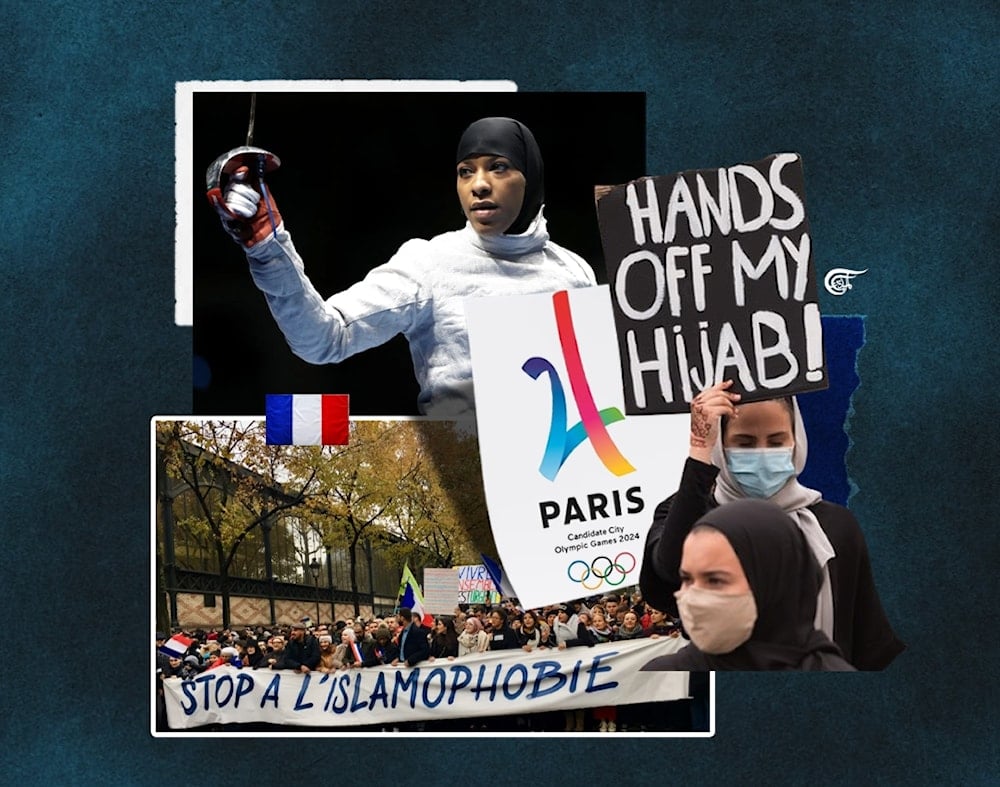France adds Olympics hijab ban to its track record of discrimination against Muslims
France's instances of deep-seated Islamophobia are not mere coincidences or naive mistakes. These are conscious efforts to discriminate against Muslims in an attempt to segregate them from non-Muslims in France.
-

France has long been Islamophobic toward Muslims (Illustrated by Zeinab al-Hajj; Al Mayadeen English)
There is so much that the world gets wrong about Islam, labeling it as an "oppressive", "unjust" religion, primarily for women. This Islamophobic myth is not only tone-deaf; it is a serious misrepresentation of Islam. France recently barred Muslim women from wearing hijab, a protective garment that women wear to symbolize modesty, in this year’s Olympics. Often, wearing a hijab is associated with oppression when in truth, it is a conscious choice made by Muslim women for themselves.
In hindsight and from a historical standpoint, France has been Islamophobic toward Muslims who constitute 10 percent of the total population. In 2004, the French Senate passed a bill, banning headscarves across public schools. This tragedy was followed by a first-of-its-kind burqa ban in 2010 that restricted Muslim women from wearing a garment that fully covered them from head to toe. According to research, in 2017, only 39 percent of French citizens found Islam to be compatible with France, while more than 75 mosques were under ruthless surveillance by the French government. Workplace discrimination is prevalent, too, affecting Muslims who are less than half as likely to receive an employer response compared to their Christian counterparts. These instances of deep-seated Islamophobia are not mere coincidences or naive mistakes. These are conscious efforts to discriminate against Muslims in an attempt to segregate them from non-Muslims in France.
French Sports Minister Amelie Oudea-Castera made the announcement of the Olympics hijab ban last year. Since France is hosting the Olympics this year, the organizing committee saw an opportunity to target Muslims once again. However, a backlash has grown stronger as the Olympic games draw closer, and rightfully so, because France not only violated the International Human Rights Law, it violated the Olympics Charter, which prohibits discrimination based on race, color, sex, and religion. Despite the International Olympic Committee (IOC) upholding nondiscrimination values, the organization has been slow to condemn France’s decision to ban hijabs for Muslim athletes. In fact, the IOC issued a statement, claiming that France’s prohibition on sports hijabs was outside the remit of the Olympic movement, further stating that “freedom of religion is interpreted in many different ways by different states.”
Olympic games are a measure of muscular strength and athleticism, not religious values that reflect how one chooses to dress. France’s claim of being the first to be gender-equal in this year’s Olympics cycle, achieving a 50:50 male-to-female ratio is hypocritical on many fronts. You cannot achieve gender parity by discriminating against women’s right to wear what they choose. France would never ban bikinis or swimsuits in sports but will be quick to violate a woman’s right to dress modestly in the Olympic games. That is clear-cut gender discrimination based on cultural and religious values.
It is unknowable why the French government has been so draconian in the past toward millions of Muslims living in the country. Cultural stereotyping and the media’s constant misrepresentation may be contributing factors that are fueling Islamophobic violence. Similarly, France’s anti-Muslim policies and misconduct in the past have negatively shaped public opinion about Muslims and there appears to be a point of no return.

 Haider Rifaat
Haider Rifaat
 3 Min Read
3 Min Read





